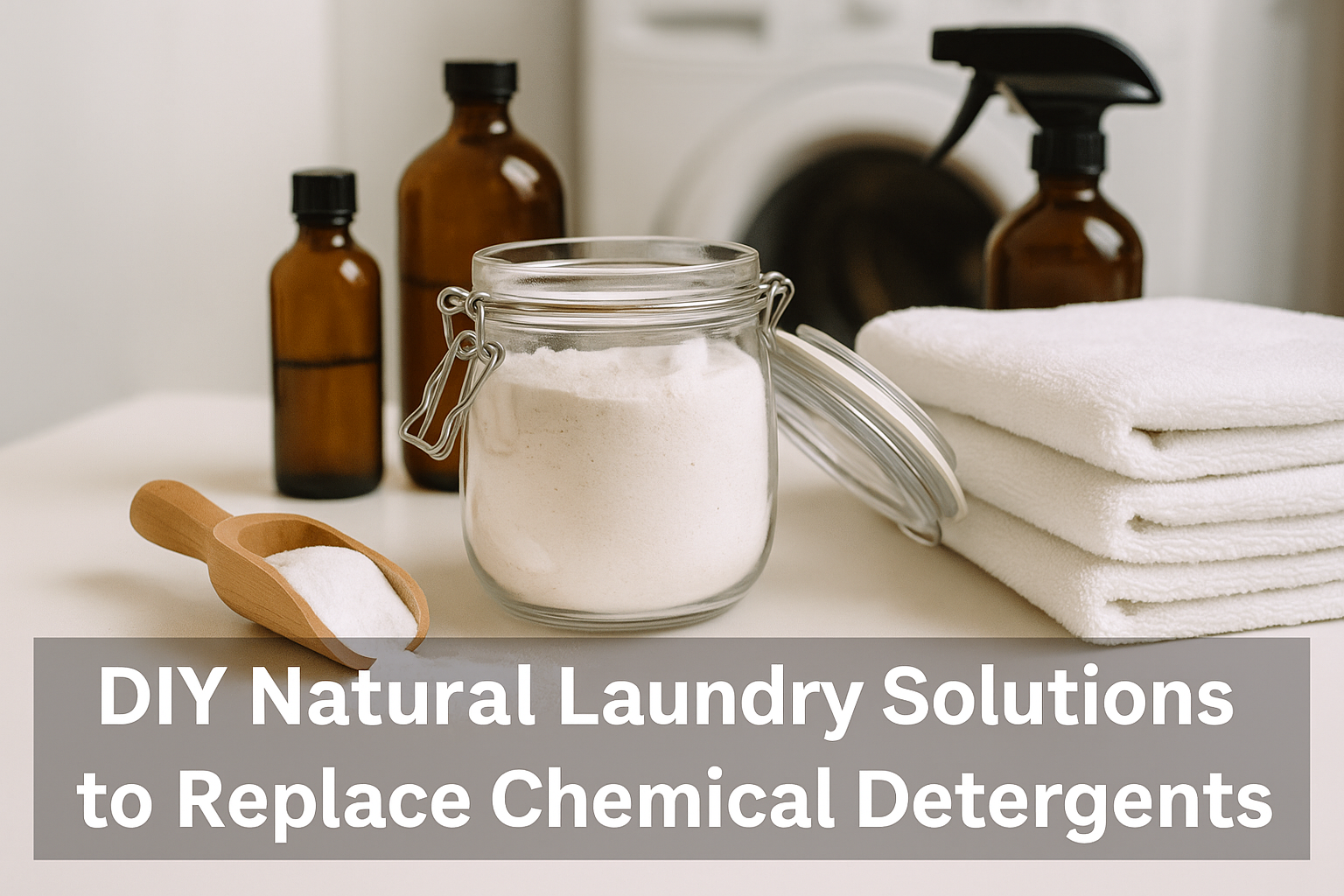Laundry is one of the most repetitive household chores. Clothes, sheets, and towels go through endless cycles of washing, drying, and folding.
For many families, commercial detergents are the default choice. They promise bright whites, deep cleaning, and strong fragrances.
But most contain harsh chemicals, synthetic fragrances, and phosphates that may irritate the skin, pollute water systems, and shorten the life of fabrics.
DIY natural laundry solutions are safer, cheaper, and surprisingly effective. With ingredients like baking soda, vinegar, soap nuts, and essential oils, you can wash clothes thoroughly while protecting health and environment.
Beyond cleaning, these natural options also add cultural meaning, echoing traditional methods of washing with herbs, ashes, and plant-based soaps.
This guide explores natural alternatives to detergent, explains why they work, and provides recipes for liquid soaps, fabric softeners, stain removers, and scent boosters. By the end, you will have everything needed to set up a natural laundry routine at home.
Why replace chemical detergents
Skin health
Synthetic detergents leave residues that may trigger allergies, eczema, or itching. Children and people with sensitive skin are especially affected. Natural solutions rinse cleanly and avoid harsh additives.
Environmental impact
Conventional detergents release phosphates and surfactants into rivers, disrupting aquatic ecosystems. Natural alternatives like soap nuts and vinegar are biodegradable.
Fabric longevity
Strong chemicals weaken fibers and fade colors over time. Natural methods clean gently, helping clothes last longer.
Cost savings
Homemade solutions cost a fraction of branded products. A box of baking soda or vinegar bottle can replace multiple laundry additives.
Key ingredients for natural laundry
Baking soda
Balances pH, removes odors, and softens water. Excellent deodorizer.
White vinegar
Natural softener that reduces static and dissolves residues.
Soap nuts
Dried fruit shells containing saponin, a natural detergent. They can be reused several times.
Castile soap
Vegetable-based liquid soap that creates gentle suds.
Lemon juice
Natural bleaching effect for whites.
Hydrogen peroxide
Mild disinfectant and brightener.
Essential oils
Lavender, rosemary, or lemon add fragrance and antibacterial properties.
All-purpose laundry detergent
- 1 cup liquid castile soap
- ½ cup washing soda
- ½ cup baking soda
- 10 drops lavender oil
- 5 drops lemon oil
Mix ingredients in a container. Use ¼ cup per load. Works for most fabrics and removes odors effectively.
Vinegar fabric softener
- 2 cups white vinegar
- 20 drops essential oil (lavender, rosemary, or orange)
Pour ½ cup into fabric softener compartment. Softens fibers, reduces static, and leaves clothes fresh.
Natural stain remover spray
- 1 cup water
- ½ cup hydrogen peroxide
- ½ cup baking soda
- 10 drops lemon oil
Spray directly on stains before washing. Especially effective for sweat, food, and mud.
Soap nut detergent
- 4–5 soap nuts
- Small cotton bag
Place bag in washing machine with clothes. Nuts release natural saponin, cleaning without foam. Reuse up to 5 times.
Scent booster powder
- 1 cup baking soda
- ½ cup Epsom salt
- 20 drops essential oil
Sprinkle 2 tbsp directly into drum. Neutralizes odors and adds gentle scent.
Brightening solution for whites
- ½ cup lemon juice
- ½ cup hydrogen peroxide
- 2 cups hot water
Soak whites for one hour before washing. Naturally brightens without bleach.
How to wash different fabrics naturally
Cotton
Use all-purpose detergent with vinegar softener.
Wool
Wash gently with castile soap and cold water. Add lavender oil for moth protection.
Towels
Use vinegar rinse to prevent stiffness.
Baby clothes
Use baking soda and castile soap, avoiding strong oils.
Sportswear
Use baking soda and lemon oil for odor control.
Traditional roots of natural laundry
Before detergents existed, families relied on plants and minerals. Ash water was used to remove grease. Herbs like rosemary and marcela were infused to freshen linens. Sunlight itself was a natural bleach. By reviving these traditions with modern adjustments, natural laundry solutions become not only healthier but also culturally meaningful.
Safety tips
Always test oils on fabrics before wide use. Avoid vinegar on silk or rayon. Do not mix vinegar with hydrogen peroxide in the same container. Store solutions in labeled bottles away from children.
Designing a natural laundry routine
Daily
Use all-purpose detergent with vinegar softener.
Weekly
Soak whites in lemon and peroxide solution. Refresh towels with baking soda.
Monthly
Deep clean washing machine by running hot water cycle with vinegar. Replace soap nuts when they stop foaming.
Mistakes to avoid
Do not overload oils in blends; they may stain fabrics. Do not expect strong artificial fragrance—natural scents are subtle. Do not mix ingredients randomly; learn safe combinations. Do not use excessive baking soda, which can leave residues.
Long-term benefits
Using natural laundry solutions reduces exposure to toxins, saves money, protects fabrics, and lowers environmental impact. It also transforms laundry from a mechanical task into a mindful practice, where each wash aligns with values of health and sustainability.
Frequently Asked Questions
Can vinegar damage my washing machine?
No. Vinegar actually helps remove mineral deposits and soap scum. Avoid using it excessively with rubber seals, but occasional use keeps the machine clean.
Do natural detergents clean as well as commercial ones?
Yes, especially for everyday laundry. For heavy grease, pretreat with baking soda or lemon juice before washing.
Can I wash baby clothes with natural solutions?
Yes. Baking soda and castile soap are safe and gentle. Avoid strong essential oils in infant clothing.
Are soap nuts effective in cold water?
Yes, but they work best in warm water. In cold cycles, soak them in hot water first and pour liquid into the machine.
Do natural solutions disinfect clothes?
Hydrogen peroxide, vinegar, and certain essential oils like tea tree provide mild disinfection. For high-risk loads, use hot water in addition.
Will my laundry smell fresh without synthetic perfumes?
Yes, but the scent will be subtle. You can boost fragrance with lavender, lemon, or orange oils. Unlike synthetic perfumes, natural scents fade gently without overwhelming.
How long do homemade detergents last?
Liquid detergents last up to a month if stored in sealed bottles. Dry powders can last six months or more.
Conclusion
DIY natural laundry solutions are effective replacements for chemical detergents.
With baking soda, vinegar, castile soap, soap nuts, and essential oils, you can clean clothes thoroughly while protecting health and environment. They save money, extend fabric life, and preserve traditions of natural washing that go back generations.
By integrating natural detergents, softeners, stain removers, and scent boosters into your routine, you transform laundry into a sustainable, mindful practice. Clothes come out clean, fresh, and safe—without the invisible costs of chemicals.

Marcela Cardozo is passionate about Southern Brazilian traditions and the cultural stories carried through natural scents. She blends knowledge of native herbs, essential oils, and regional rituals to create practical and inspiring content. Her writing connects ancestral wisdom with modern living, offering readers simple ways to bring authenticity, well-being, and meaning into their everyday lives.
